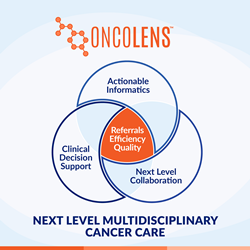ATLANTA (PRWEB) JULY 13, 2023
OncoLens provides an integration and collaboration platform to cancer centers, helping derive intelligence from swaths of disparate structured and unstructured data to empower centers to identify patients for clinical trials, research, biomarker testing and more. Insights derived are funneled into collaboration workflows and matched with clinical decision support to assist often siloed multi-disciplinary teams to determine the best plan forward for the patient.

With the investment and partnership from Cross Border , OncoLens plans to expand its domestic and global footprint into regions including rural communities and low-middle income countries where there are needs to add capacity, resources and access to shared expertise to identify the right diagnostics and treatments for patients, as well as support much needed diversity and inclusion in access and research.
With more than 200 cancer centers in the U.S and clients in the larger EMEA (Europe, Middle East and Africa) region, OncoLens’ network enables cross collaboration between multiple entities whether they are academic center/NCIs (national cancer institutes) and their community affiliates, large integrated delivery networks (IDNs) or across international borders. “With this new investment from Cross Border, we are excited to align our existing and future clients to international collaboration, improved patient care, and revenue opportunities,” says Anju Mathew, CEO of OncoLens.
“With an established network, OncoLens is on the cusp of creating an unprecedented global network of oncology providers that will open up access to cutting edge solutions for patients, enable global collaboration and intelligence sharing across the oncology ecosystem. We look forward to participating on this journey with the OncoLens team,” says Donna Parr, managing director and partner at Cross Border Impact Ventures.
ABOUT ONCOLENS
OncoLens enables multidisciplinary cancer care across the continuum. Through a streamlined, secure HIPAA-compliant infrastructure, OncoLens drives intra-enterprise, community, and network participation in multidisciplinary care planning, tracking, and delivery. Using OncoLens, cancer care providers view a singular view of the patient including outpatient and in-patient clinical data, pathology, radiology, genomics and genetic information. They can collaborate on treatment plans, track quality for accreditation, and alignment to care pathways. As a result, health systems maximize clinical trial participation, an extended referral stream, and the creation of a center of excellence that can be leveraged to support patient care and provider education. http://www.oncolens.com
ABOUT CROSS BORDER IMPACT VENTURES
Cross-Border Impact Ventures is an impact venture capital firm on a mission to revolutionize venture capital investing in health technology. We invest in early growth stage health technology companies relevant to women, children and adolescent health and located in North America, Europe and Israel with ability to scale technologies to Emerging Markets. We seek to expand access to world class technologies inclusively and globally because good health should not be restricted by gender, age, race, wealth and borders. http://www.crossborder.ventures
CONTACT
OncoLens: info@oncolens.com

P: 404.221.0617
Fax: 404.448.3982
Email: admin@galifesciences.org
Address: 8607 Roberts Drive, Suite 250, Atlanta, GA 30350


